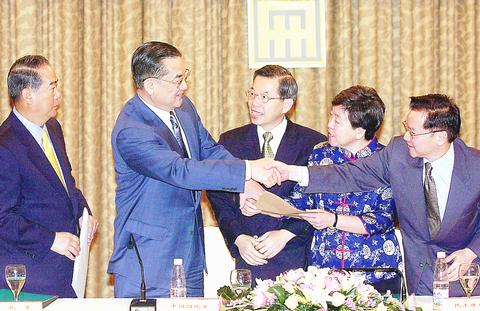Political leaders across party lines yesterday agreed to push for quick implementation of the proposals agreed to at last month's Economic Development Advisory Conference. They also want to promote further inter-party cooperation to help resolve Taiwan's economic problems.
The agreement was reached at a summit of party leaders and groups with deputies in the legislature. The summit was intended as the closing event for inter-party negotiations initiated by the KMT, the majority party in the legislature.
Those attending included KMT Chairman Lien Chan (

PHOTO: FANG PIN-CHAO, TAIPEI TIMES
"Today we've opened a door to inter-party cooperation. Under this atmosphere, we hope that we can further conduct issue-based cooperation to promote national prosperity and stability and the well-being of the people," Lien said.
Under the agreement, the political parties and groups will work to pass 34 pieces of priority legislation in the Legislative Yuan before the legislature is adjourned on Nov. 1 in preparation for the legislative elections.
The 34 items include 20 that are designed to implement the resolutions of the economic conference. The other 14 are aimed at preparing for Taiwan's expected accession to the WTO at the end of the year.
Also, the legislative caucuses of the various parties will set up a monitoring panel to ensure that the executive branch implements the economic conference's proposals in accordance with its targets.
In addition to the substantive measures to improve the economy, the political leaders concurred that other "non-economic factors" that are hampering economic development should be eliminated.
"The parties concerned will continue to push for inter-party amity and cooperation, abide by the constitutional system and build up steady relations between the executive and legislative branches to pursue a long-lasting peace for the country," the agreement stated.
With the prerequisite that Taiwan's national security is protected, the political leaders urged the government to negotiate with China as soon as possible on bilateral issues that are expected to arise after Taiwan's admission into the WTO.
"The authorities on both sides should resolve their differences and resume the cross-strait dialogue carried out by their respective agencies as soon as possible on the basis of the achievement of the 1992 meeting and a subsequent agreement reached in the Koo-Wang meeting of 1993," the agreement said.
The agreement, as soon as it was released, was presented to Premier Chang Chun-hsiung (
Chang promised that the Executive Yuan would implement the consensus of the Economic Development Advisory Conference comprehensively.
"Pursuing reconciliation between the ruling and opposition parties and the ideal of inter-party cooperation, the Executive Yuan will work hand in hand with the Legislative Yuan to work for the economy," Chang said.
While the Executive Yuan is accelerating the pace of legislative drafting so that bills can be sent to the legislature for review as soon as possible, the Council for Economic Planning and Development has been charged with the task of managing and evaluating the progress of implementation, Chang said.
Wang also said that the legislature would do its part, in line with the agreement reached at yesterday's political summit.

INVESTIGATION: The case is the latest instance of a DPP figure being implicated in an espionage network accused of allegedly leaking information to Chinese intelligence Democratic Progressive Party (DPP) member Ho Jen-chieh (何仁傑) was detained and held incommunicado yesterday on suspicion of spying for China during his tenure as assistant to then-minister of foreign affairs Joseph Wu (吳釗燮). The Taipei District Prosecutors’ Office said Ho was implicated during its investigation into alleged spying activities by former Presidential Office consultant Wu Shang-yu (吳尚雨). Prosecutors said there is reason to believe Ho breached the National Security Act (國家安全法) by leaking classified Ministry of Foreign Affairs information to Chinese intelligence. Following interrogation, prosecutors petitioned the Taipei District Court to detain Ho, citing concerns over potential collusion or tampering of evidence. The

‘FORM OF PROTEST’: The German Institute Taipei said it was ‘shocked’ to see Nazi symbolism used in connection with political aims as it condemned the incident Sung Chien-liang (宋建樑), who led efforts to recall Democratic Progressive Party (DPP) Legislator Lee Kun-cheng (李坤城), was released on bail of NT$80,000 yesterday amid an outcry over a Nazi armband he wore to questioning the night before. Sung arrived at the New Taipei City District Prosecutors’ Office for questioning in a recall petition forgery case on Tuesday night wearing a red armband bearing a swastika, carrying a copy of Adolf Hitler’s Mein Kampf and giving a Nazi salute. Sung left the building at 1:15am without the armband and apparently covering the book with a coat. This is a serious international scandal and Chinese

Seventy percent of middle and elementary schools now conduct English classes entirely in English, the Ministry of Education said, as it encourages schools nationwide to adopt this practice Minister of Education (MOE) Cheng Ying-yao (鄭英耀) is scheduled to present a report on the government’s bilingual education policy to the Legislative Yuan’s Education and Culture Committee today. The report would outline strategies aimed at expanding access to education, reducing regional disparities and improving talent cultivation. Implementation of bilingual education policies has varied across local governments, occasionally drawing public criticism. For example, some schools have required teachers of non-English subjects to pass English proficiency

TRADE: The premier pledged safeguards on ‘Made in Taiwan’ labeling, anti-dumping measures and stricter export controls to strengthen its position in trade talks Products labeled “made in Taiwan” must be genuinely made in Taiwan, Premier Cho Jung-tai (卓榮泰) said yesterday, vowing to enforce strict safeguards against “origin laundering” and initiate anti-dumping investigations to prevent China dumping its products in Taiwan. Cho made the remarks in a discussion session with representatives from industries in Kaohsiung. In response to the US government’s recent announcement of “reciprocal” tariffs on its trading partners, President William Lai (賴清德) and Cho last week began a series of consultations with industry leaders nationwide to gather feedback and address concerns. Taiwanese and US officials held a videoconference on Friday evening to discuss the